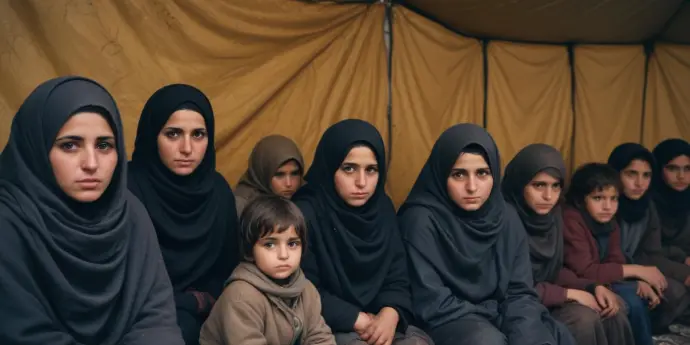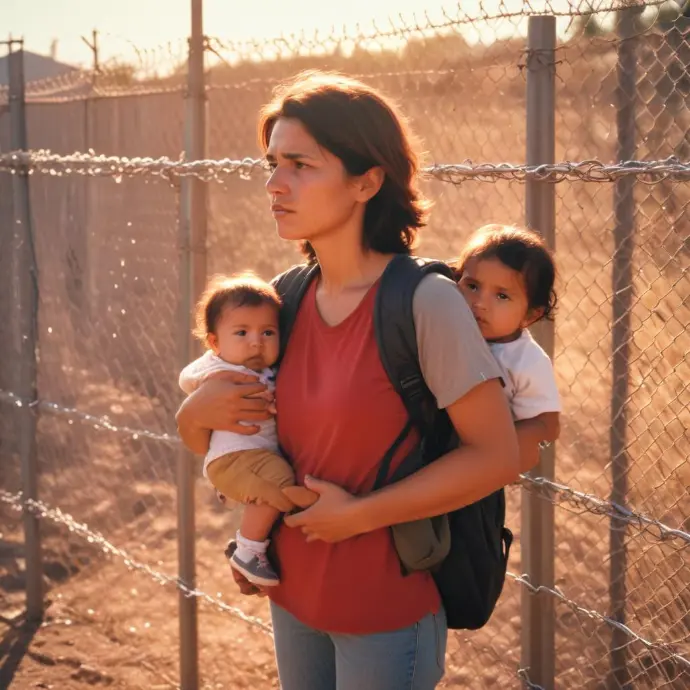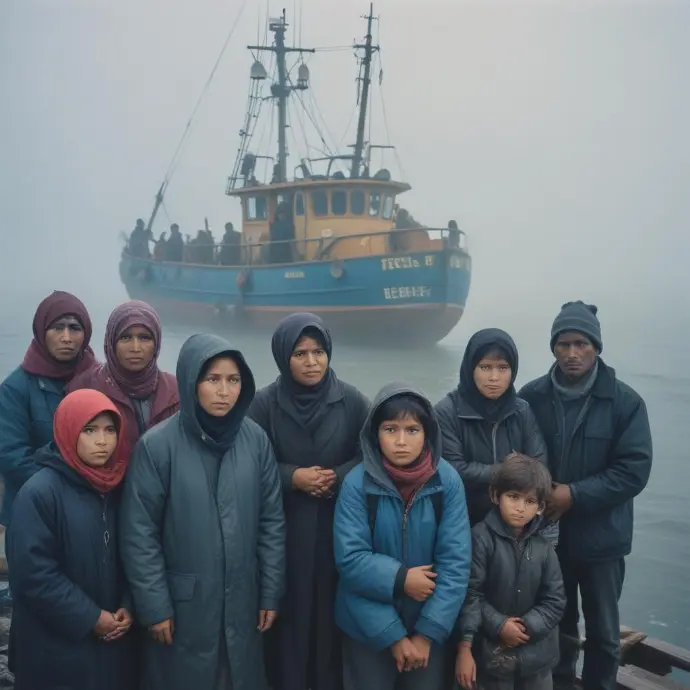The Right to Non-Refoulement: The Principle of Non-Refoulement in Refugee Protection
On our website, you will find an in-depth and detailed analysis of human rights at a global level. This time, you will delve into the fascinating world of the Principle of Non-Refoulement in Refugee Protection, a topic of vital importance. Get ready to discover the importance of this principle and its impact on refugee protection. Are you ready to explore this crucial topic? Read on and immerse yourself in the fascinating world of human rights!


Introduction
The principle of non-refoulement is a fundamental concept in the protection of refugees and displaced persons that seeks to ensure that no person is returned to a country where their life, liberty, or integrity would be at risk. This principle is a cornerstone of international human rights law and aims to protect those fleeing conflict, persecution, or violations of fundamental rights in their countries of origin.
Refugees are people who are outside their country of origin due to well-founded fears of persecution for reasons of race, religion, nationality, membership in a social group, or political opinion, and who are unable or unwilling to avail themselves of the protection of their country. Internally displaced persons, on the other hand, are people who have been forced to leave their homes but remain within the borders of their country. The situation of refugees and displaced persons is particularly vulnerable, as they face uncertainty, lack of resources, and the possibility of being returned to dangerous situations in their places of origin.
The principle of non-refoulement is crucial to ensuring the safety and protection of refugees and displaced persons. By preventing their return to dangerous situations, they are given the opportunity to rebuild their lives in a safe place and seek asylum or international protection. This principle is enshrined in the 1951 Convention relating to the Status of Refugees and in international human rights law, and its respect is fundamental to the international community.
Furthermore, the principle of non-refoulement fosters solidarity and cooperation among countries to ensure the protection of those in situations of extreme vulnerability. Recognizing the importance of this principle promotes respect for the dignity and human rights of refugees and displaced persons.
The principle of non-refoulement is rooted in the 1948 Universal Declaration of Human Rights, which establishes the right of everyone to seek and enjoy asylum in other countries. Subsequently, the 1951 Convention relating to the Status of Refugees and its 1967 Protocol reaffirmed this principle and established States' obligations regarding refugee protection.
The jurisprudence of international and regional courts, as well as the work of specialized agencies such as UNHCR (the UN Refugee Agency), have contributed to consolidating the principle of non-refoulement as a peremptory norm in international law. Its effective implementation is essential to ensure the protection of those fleeing situations of grave risk in their countries of origin.
Origin and Evolution of the Principle of Non-Refoulement
The principle of non-refoulement, also known as the principle of non-return, has its roots in international refugee law. This principle is established in Article 33 of the 1951 Convention relating to the Status of Refugees and prohibits states from returning a refugee to any country where their life or freedom would be endangered on account of their race, religion, nationality, membership in a particular social group, or political opinion. The evolution of this principle has been fundamental in protecting the human rights of people seeking refuge in other countries due to situations of conflict, persecution, or violence.
The principle of non-refoulement has been the subject of significant debate and development over the years, particularly in response to humanitarian crises and mass population displacement. Its importance lies in guaranteeing a safe and secure space for those fleeing situations of violence and persecution, offering them the opportunity to rebuild their lives away from imminent threats.
This principle has become a fundamental pillar of international humanitarian law, establishing a clear standard for the protection of the fundamental rights of refugees and contributing to the preservation of human dignity in contexts of crisis and conflict.
International legislation has strengthened the principle of non-refoulement over the years, recognizing its importance in protecting the human rights of refugees. In addition to the 1951 Convention Relating to the Status of Refugees, other legal instruments have addressed this principle and reaffirmed its relevance in the global context.
The Universal Declaration of Human Rights, in Article 14, establishes that "Everyone has the right to seek and to enjoy in any country asylum from persecution." This principle lays the foundation for the protection of those seeking refuge in other countries, reinforcing the notion of non-refoulement at the international level.
Likewise, the Convention against Torture and Other Cruel, Inhuman or Degrading Treatment or Punishment prohibits the return of a person to a country where there is a well-founded risk of torture, complementing the principle of non-refoulement in specific cases of serious threat to the physical and psychological integrity of individuals.
These legal instruments have helped consolidate the principle of non-refoulement as an essential element in the international protection of the human rights of refugees, establishing a legal framework that guarantees their safety and well-being in situations of extreme vulnerability.
The impact of the principle of non-refoulement on refugee protection is significant, as it provides a solid legal framework for guaranteeing safe haven to those facing persecution and danger in their countries of origin. By preventing the return of people to environments where their lives or freedom are at risk, this principle contributes to preserving the integrity and dignity of refugees, giving them the opportunity to rebuild their lives in safety and freedom from fear.
Furthermore, the principle of non-refoulement has promoted international solidarity and fostered cooperation among states to ensure refugee protection. By establishing a clear standard of non-refoulement in situations of grave danger, this principle has strengthened asylum and humanitarian protection mechanisms globally, promoting a human rights-based approach in responding to humanitarian crises and forced displacement.
The principle of non-refoulement has had a significant impact on refugee protection internationally, by establishing a legal framework that prohibits the return of people to environments where their lives or freedom are at risk.
This principle reflects a fundamental commitment to preserving the human rights and dignity of individuals seeking refuge in other countries and remains a fundamental pillar of international humanitarian law.
The principle of non-refoulement is fundamental to refugee protection and seeks to prevent a person from being returned, expelled, or rejected at the borders of a country where their life or freedom is at risk.
One of the most notable cases of the application of this principle is that of Syrian refugees in Turkey.
Since the beginning of the conflict in Syria, Turkey has welcomed millions of Syrian refugees and has applied the principle of non-refoulement, offering them international protection and humanitarian assistance.
Another relevant example is Colombia, a country that has received a large number of Venezuelan refugees fleeing the political and economic crisis in their country. Colombia has applied the principle of non-refoulement and established measures to regularize the situation of refugees, guaranteeing them access to basic services and integration opportunities.
Furthermore, in Europe, countries such as Germany and Sweden have applied the principle of non-refoulement in the context of the refugee crisis, offering protection to people fleeing conflict and persecution in their countries of origin. These cases exemplify the importance of respecting the principle of non-refoulement to ensure the safety and well-being of people seeking refuge in other countries.
Application of the Principle of Non-Refoulement in Different Regions of the World
Europe has been a benchmark in the protection of refugee rights through the principle of non-refoulement. This principle, enshrined in Article 33 of the 1951 United Nations Convention Relating to the Status of Refugees, prohibits States from returning any person to a country where their life or liberty would be in danger. In the European context, this principle has been significantly applied in humanitarian crisis situations, such as the 2015 refugee crisis, where protection was provided to large numbers of people fleeing conflict and persecution in their countries of origin.
Furthermore, the jurisprudence of the European Court of Human Rights has strengthened the application of this principle by establishing that States have the obligation to individually assess asylum applications and provide protection to those who face serious risks if returned to their countries of origin. This interpretation has set an important precedent for refugee protection in the region.
The European Union, through its European Asylum Agency, has also played a fundamental role in promoting and guaranteeing refugee rights, including respect for the principle of non-refoulement in member countries.
In the Americas, the principle of non-refoulement has been a fundamental pillar of refugee protection. Article 22 of the American Convention on Human Rights establishes the prohibition of expelling, returning, or extraditing a person to another country where they may face violations of their fundamental rights. This provision has been crucial in protecting people fleeing persecution, violence, and conflict in countries such as Venezuela, Colombia, and Honduras, among others.
Organizations such as the Inter-American Commission on Human Rights and UNHCR have collaborated closely to ensure respect for this principle in the region, providing assistance and protection to refugees and asylum seekers in the Americas. Likewise, the creation of temporary protection mechanisms and the implementation of resettlement programs have contributed to ensuring that people in vulnerable situations have access to international protection without fear of being returned to dangerous environments.
The effective implementation of the principle of non-refoulement in the Americas has been fundamental to guaranteeing the safety and respect for the human rights of forcibly displaced persons in the region.
In Asia, the principle of non-refoulement has been a relevant issue in the context of refugee protection. While the region presents particular challenges in terms of human mobility and international protection, several Asian countries have ratified the Convention relating to the Status of Refugees and incorporated the principle of non-refoulement into their national legal frameworks.
Countries such as Pakistan, Bangladesh, and Thailand have hosted large numbers of refugees, particularly from Afghanistan, Myanmar, and other contexts of conflict and persecution. Despite the challenges, these nations have worked in collaboration with UNHCR and other organizations to ensure that refugees receive effective protection and are not returned to risky situations.
Regional cooperation, through the 1984 Cartagena Declaration, has been an important instrument in addressing refugee protection in Asia, promoting the implementation of the principle of non-refoulement and access to durable solutions for displaced persons. Despite the challenges, the region has demonstrated significant progress in protecting refugee rights through respect for this fundamental principle.
The principle of non-refoulement, also known as the principle of non-return, is a fundamental component of international refugee law that prohibits States from returning any person to a country where their life, liberty, or fundamental rights are at risk. In the African context, this principle takes on particular relevance due to the presence of numerous armed conflicts, humanitarian crises, and widespread human rights violations in the region. Countries such as South Sudan, Somalia, the Democratic Republic of the Congo, and Nigeria have witnessed mass displacement and persecution, making respect for and effective implementation of the principle of non-refoulement of vital importance in Africa.
In Africa, the African Union Convention on Internally Displaced Persons, also known as the Kampala Convention, is a regional instrument that addresses the issue of internally displaced persons and complements refugee protection. While the Kampala Convention does not specifically address the principle of non-refoulement, it underscores the importance of ensuring protection and assistance to internally displaced persons, reflecting the African Union's commitment to protecting people forced to leave their homes due to conflict, violence, or human rights violations.
The effective implementation of the principle of non-refoulement in Africa requires close cooperation between States, regional organizations, and humanitarian actors. Furthermore, it is crucial for African States to strengthen their asylum systems, improve refugee reception capacity, and ensure that asylum seekers receive fair and humane treatment. In a context where the protection of refugees and internally displaced persons remains a challenge, promoting and upholding the principle of non-refoulement is critical to protecting the human rights of those seeking refuge on the African continent.
Challenges and Controversies in the Application of the Principle of Non-Refoulement
The principle of non-refoulement is fundamental to refugee protection, as it prohibits a person from being returned or expelled to a country where their life, liberty, or integrity is at risk. However, this principle often conflicts with the sovereignty of states, which argue that they have the right to control their borders and decide who can enter their territory.
This tension between the principle of non-refoulement and state sovereignty has led to complex situations, especially in regions where armed conflicts, humanitarian crises, and mass migration flows converge. States face the challenge of balancing the protection of human rights with their sovereign obligations, which generates debates and controversies in the application of this principle.
To address these sovereignty conflicts and the application of the principle of non-refoulement, it is crucial to foster dialogue and international cooperation, as well as promote legal frameworks and agreements that respect both national security and the human rights of refugees.
The implementation of the principle of non-refoulement faces significant legal and ethical challenges. In the legal realm, the complexity arises in accurately determining whether a person qualifies as a refugee and whether their life is at risk if returned to their country of origin. This entails conducting thorough and fair assessment processes, which require significant resources and capabilities on the part of receiving states.
From an ethical perspective, the application of the principle of non-refoulement involves making decisions that will directly impact the lives and safety of individuals. There is a responsibility to ensure that these decisions are made fairly, impartially, and with consideration for the well-being of refugees.
Furthermore, political pressure and public opinion can influence the implementation of this principle, generating additional ethical and legal dilemmas. Therefore, it is essential to establish clear and transparent protocols that guide the process of applying the principle of non-refoulement, ensuring its consistency with international law and humanitarian principles.
The application of the principle of non-refoulement has been the subject of political and humanitarian controversies, especially in situations of migration crises and large-scale forced displacement. Receiving states often face internal and external pressures to adopt stricter policies regarding the entry and residence of refugees, which can conflict with the principle of non-refoulement.
Furthermore, there are humanitarian concerns related to the capacity of states to provide adequate protection and assistance to refugees, which influences the effective implementation of the principle of non-refoulement. A lack of resources, infrastructure, and international support can hinder compliance with this principle, generating debates about the feasibility and effectiveness of its application in certain contexts.
Addressing these political and humanitarian controversies requires a comprehensive approach that considers both national security and the protection of human rights. It is necessary to promote dialogue between states, international organizations, and civil society to find solutions that guarantee the effective and fair application of the principle of non-refoulement in the context of refugees and displaced persons.
Impact of the Principle of Non-Refoulement on Refugee Protection
The principle of non-refoulement is a fundamental pillar of refugee protection, as it establishes that no individual should be returned to a country where their life, liberty, or physical integrity would be at risk. This principle is enshrined in international law, specifically in the 1951 Convention Relating to the Status of Refugees and its 1967 Protocol.
Protection against refoulement is based on the premise that refugees are persons fleeing persecution, armed conflict, or serious human rights violations in their countries of origin. Therefore, respect for the principle of non-refoulement is essential to ensure their safety and well-being.
The guarantees associated with this principle imply that States must carefully assess asylum and refugee claims and refrain from returning applicants to risky situations. Likewise, they must provide due process and access to fair and effective asylum procedures, in accordance with international human rights standards.
Despite the importance of the principle of non-refoulement, there are times when States consider implementing alternatives. These alternatives include relocation agreements in third countries, voluntary repatriation programs, and temporary residence arrangements in exceptional cases.
However, it is crucial to assess the feasibility and effectiveness of these alternatives, ensuring that they do not compromise the safety and protection of refugees. The implementation of these measures must be consistent with States' international obligations and cannot result in a violation of the fundamental rights of persons in refugee situations.
Ultimately, respect for the principle of non-refoulement remains the cornerstone of refugee protection, and alternatives should be considered only in exceptional circumstances and with full respect for human rights.
International collaboration plays a fundamental role in strengthening and effectively implementing the principle of non-refoulement in refugee protection. States must work together to ensure that refugees receive the necessary protection and are not returned to dangerous situations.
Cooperation between countries on asylum and refugee matters, the exchange of best practices, and policy harmonization are essential elements to ensure that the principle of non-refoulement is consistently respected internationally.
Furthermore, collaboration with specialized agencies, non-governmental organizations, and civil society actors is crucial to ensure that refugees receive the necessary assistance and that their rights are protected at all times.
Conclusions
The principle of non-refoulement is fundamental to refugee protection, as it ensures that people fleeing war, persecution, or violence are not returned to situations where their lives or freedoms are at risk. This principle is enshrined in international refugee law and is essential to ensuring the safety and well-being of those seeking protection in other countries.
The importance of this principle lies in the fact that it provides a vital safeguard for those forced to leave their homes in search of safety. Without the protection of the principle of non-refoulement, refugees would be exposed to a heightened risk of persecution, torture, or even death, which would seriously undermine the fundamental human rights of these vulnerable people.
It is crucial that States fulfill their obligations under the principle of non-refoulement, providing a safe haven for those seeking international protection and preventing them from being returned to dangerous situations. The effective implementation of this principle is essential to ensuring the dignity and safety of refugees worldwide.
Despite the importance of the principle of non-refoulement, there are significant challenges that threaten its effectiveness in protecting refugees. Political pressure, lack of resources, and the reluctance of some countries to comply with their international obligations are key obstacles that must be addressed to strengthen this principle.
To ensure the effective protection of refugees through the principle of non-refoulement, it is crucial that States strengthen their commitment to international refugee law and allocate the necessary resources to provide assistance and protection to those in need. Likewise, greater international cooperation and solidarity among countries are required to address the root causes of forced migration and ensure that refugees receive the support they deserve.
Furthermore, initiatives should be promoted to raise awareness of the importance of the principle of non-refoulement and advocate for its respect and application in all contexts. Public awareness and international pressure can play a crucial role in strengthening this principle and protecting refugee rights worldwide.

 IHRO NEWS
IHRO NEWS

